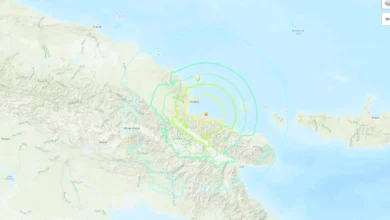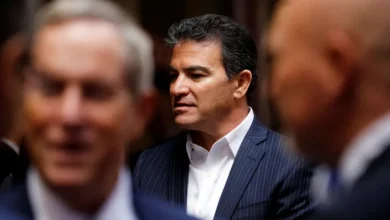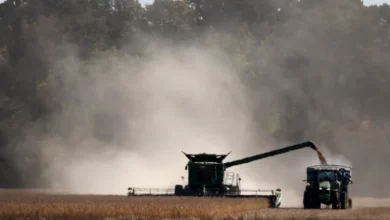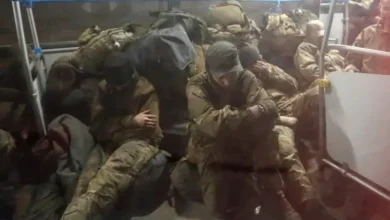‘My children have been sick’: The toxic aftermath of a train derailment
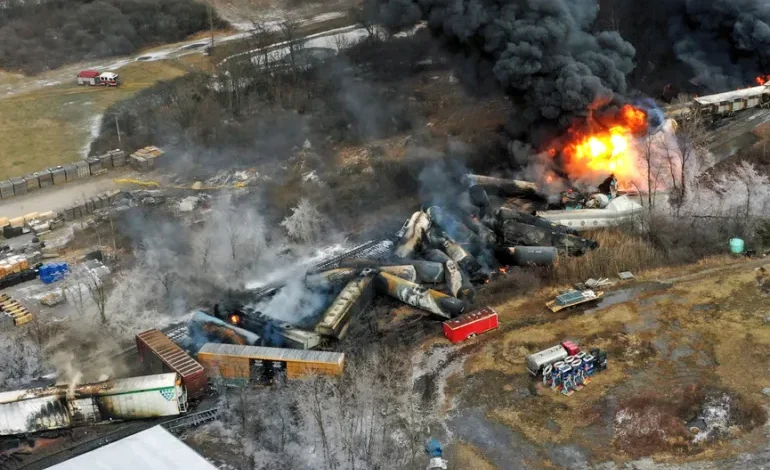
The Norfolk Southern train line runs right through East Palestine, Ohio, stopping cars and pick-up trucks on their way into town at the railway crossing. It can be a long wait, as train car after train car, some carrying toxic chemicals, roll past the clanking railroad crossing sign. The village, home to fewer than 5,000 people, was decorated with American flags for the upcoming Independence Day celebrations when I arrived there in late June.
Morgan Parker laughed as I paused my interview to wait for the rumbling to pass. “I don’t even notice it any more,” the longtime resident said of the noise. But the lingering impact of a massive train derailment that happened nearby on the evening of February 3, 2023, is something she thinks about constantly.
I was there in June to cover a meeting of the National Transportation Safety Board (NTSB) which was in town to present its final report on what caused the crash and what happened two days later when five of the 38 derailed cars were blown open and set on fire by local authorities on the advice of Norfolk Southern and some of its contractors.
The derailed cars were carrying 1.1 million pounds of toxic vinyl chloride, and the authorities were worried that not doing this would result in a more catastrophic, uncontrolled explosion.
This is a process known as “vent and burn” – a high-skill but very much last resort and potentially dangerous method of clearing chemical pollution from the environment. It is an option rarely taken.
The vent and burn – during which vinyl chloride was allowed to drain out of the cars into a trench and then set alight with flares – had spewed toxic black smoke into the air and forced everyone within a one-mile (1.5 km) radius to flee their homes. Chemical pollution released from the crash has since been detected across 16 states.
The headline from the NTSB meeting was that its chair, Jennifer Homendy, accused Norfolk Southern of interfering with the investigation. The report blamed the company for the derailment and found that the vent and burn had been unnecessary.
The news only further enraged the residents who believed they had effectively been poisoned by the crash and the subsequent vent and burn. As far as residents like Parker were concerned, the final report was far from the end of the story.
Those who lived within a 32km (20-mile) radius of the crash site had just days to decide whether or not to accept their share of a $600m settlement on offer from Norfolk Southern to compensate them for the disaster.
Parker, a single mother of two, had moved her children out of the two-family home owned by her mother for five months. Since coming back, she said, she had been suffering from constant nasal drip, and was worried about the chemicals that had been released and the lingering effects.Norfolk Southern has admitted no wrongdoing in the settlement and has stood by its recommendation to vent and burn, denying that it withheld any information from first responders or local officials and saying it “cooperated fully and ethically with the investigation”.
‘My hair started to fall out’
Parker came to the East Palestine High School auditorium to hear the findings of the NTSB, as did Carly Tunno who lives on the Pennsylvania side of the border. Tunno said she was frustrated by what she saw as the report’s lack of answers related to environmental contamination. But most of all, she was terrified about its potential effects on her family’s health.
“At the end of March 2023, my hair started to fall out,” explained the mother of two young children who wore a scarf over her head. “I’ve lost all the hair on my head. My children have been sick constantly – rashes, things like that.”
